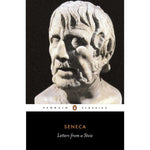- Home
- Non-Fiction
- Letters From A Stoic
Letters From A Stoic
Couldn't load pickup availability
Summary
Letters from a Stoic is a collection of moral epistles written by the Roman philosopher Seneca to his friend Lucilius. These letters, which form a cornerstone of Stoic philosophy, offer practical advice on how to live a virtuous and tranquil life by applying Stoic principles. Seneca explores various topics, such as the nature of happiness, the importance of self-discipline, the art of dealing with adversity, and how to achieve peace of mind through reason and virtue. Throughout the letters, Seneca emphasizes the value of wisdom, courage, justice, and temperance, the four cardinal virtues in Stoicism. He also reflects on the impermanence of life and the inevitability of death, urging Lucilius—and readers—to live with intention, not squander time, and cultivate an inner strength that can withstand life's inevitable hardships.
Key Points from Letters from a Stoic
-
The Impermanence of Life and the Importance of Time
Seneca repeatedly underscores the fleeting nature of life. He encourages Lucilius to value time as the most precious commodity, advocating for mindfulness and intentional living. Instead of indulging in distractions or worrying about the future, Seneca argues that one should focus on the present moment and live virtuously. -
Stoic Control and Acceptance of Adversity
A core message of the letters is the Stoic idea of accepting what is beyond our control and mastering our reactions. Seneca teaches that while we cannot control external events, we have the power to control our thoughts and emotions. Embracing hardship with resilience and maintaining inner peace, regardless of circumstances, is essential for a virtuous life. -
Self-Discipline and Inner Strength
Seneca emphasizes the importance of self-discipline, which is key to achieving a life of virtue. He advocates for the practice of self-control, urging Lucilius to resist temptations, overcome desires, and cultivate mental strength. Through self-mastery, one can achieve true freedom and tranquility. -
Wisdom, Virtue, and Reason
According to Seneca, wisdom is the path to happiness. The Stoic virtues of courage, justice, temperance, and wisdom guide one's actions and decisions. Reason should govern every aspect of life, and by following this rational path, one can avoid being swept away by emotions and the unpredictability of the world. -
Death as a Natural Part of Life
Seneca often reflects on death in the letters, emphasizing that it is an inevitable and natural part of life. He encourages Lucilius to accept mortality with equanimity and not fear it. Living with the awareness of death, Seneca argues, can lead to a more meaningful and virtuous life, as it helps people focus on what truly matters.




